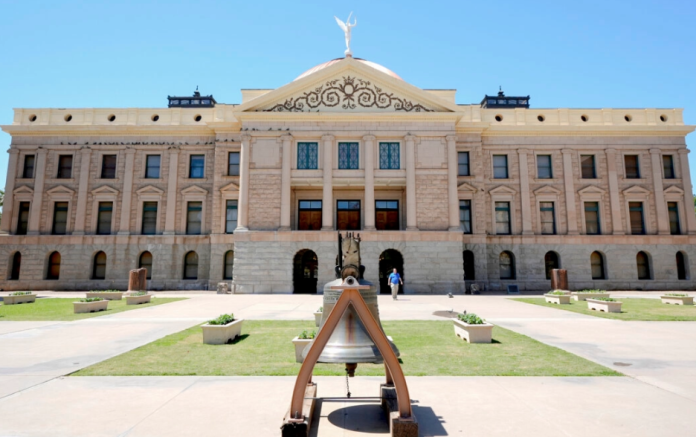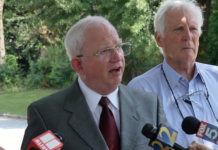Arizona’s near-total abortion ban will be repealed just weeks after the state’s Supreme Court ruled it enforceable.
The Arizona House narrowly passed the repeal on April 24 as three Republicans joined with Democrats to approve the measure.
On May 1, the state Senate followed suit in a 16–14 vote—but not before several disappointed senators had the opportunity to air their grievances.
“What we’re actually voting on is death,” state Sen. Anthony Kern said, chiding the members of his Republican party who voted with Democrats in support of the repeal.
“The Democrat Party stands and runs on death. The Republican Party stands and is supposed to run on life.”
State Sen. Sonny Borrelli, meanwhile, objected to the fact that the bill was never sent to a committee, nor was any time allotted for debate or amendments. And during one particularly emotional moment, state Sen. Justine Wadsack recounted her own tragic loss of a child by miscarriage.
“God chose when that heartbeat was going to stop,” Ms. Wadsack said, tears streaming down her face. “It is not my place as a senator to determine when a child’s heart stops beating.”
The abortion ban prohibits all abortions in Arizona except those performed to save the mother’s life. It was initially enacted in 1864, before Arizona was a state, though it was later recodified by the Legislature in the late 1970s.
Arizona Gov. Katie Hobbs, a Democrat, has promised to sign the repeal once it reaches her desk, though it will not be effective until 90 days after the Legislature adjourns. At that point, a 2022 law limiting abortions to 15 weeks of pregnancy will become the state’s prevailing law.
In the meantime, however, the abortion ban is slated to take effect on June 27.
Proponents of the repeal, pointing to the ban’s pre-statehood origins, had argued that it was outdated and inconsistent with the state’s more recent laws.
“I don’t want us honoring laws about women, written during a time when women were forbidden from voting because their voices were considered inferior to men,” state Sen. Eva Burch said May 1.
For decades, the law was blocked by a permanent injunction. But a two-year court battle, prompted by the reversal of Roe v. Wade, culminated in the Arizona Supreme Court’s bombshell ruling on April 9.
Although the court initially stayed the law’s enforcement for two weeks, an agreement in a related case pushed back its effective date.
The Arizona vote came on the same day that a six-week abortion limit in Florida took effect.
That law includes limited exceptions for situations involving rape, incest, human trafficking, or a serious threat to the mother’s physical health. But as with the Arizona ban, the law has been the subject of much controversy.
As the Florida law took effect, abortion advocates took to social media to decry what they perceived to be the erosion of women’s rights in the Sunshine State.
“Today, Florida is putting the health of millions of women at risk,” New York Gov. Kathy Hochul posted on social media. “It’s clear: Anti-choice extremists will stop at nothing to deny women their right to make their own health care decisions.”
Nikki Fried, chair of the Florida Democratic Party, likewise charged that the law had rolled back women’s rights “by 50 years,” and President Joe Biden called the situation a “nightmare.”
Florida and Arizona are expected to play a key role in deciding the next president, and abortion will be on the ballot in both states come November.
While President Biden has aligned himself with abortion advocates, former President Donald Trump, the presumptive Republican nominee, has shied away from what he’s deemed to be a losing issue for the GOP.
The former president, who claims to be pro-life, has said he believes abortion to be a states’ rights issue, as opposed to a federal issue. In taking that stance, he denounced both the Arizona and Florida laws as too restrictive.
“It’s the will of the people—this is what I’ve been saying. It’s a perfect system,” he said on April 10.
“For 52 years, people have wanted to end Roe v. Wade, to get it back to the states. We did that—it was an incredible thing, an incredible achievement. We did that, and now the states have it, and the states are putting out what they want. It’s the will of the people.”






















